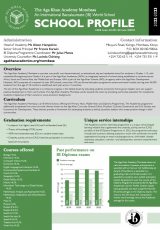Joseph Munyambanza: The story of a conqueror
As we sat for our lesson on a sweltering Tuesday afternoon, there was anticipation for the upcoming week-long break, obstructed only by the last lesson of the day. We sat for a while in a lazy stupor before our speaker arrived humbly apologising for his delay. Joseph Munyambaza was calm and composed as he began his initial talk on disparities of living. Despite appearing to be an average man who started by talking of ordinary sundries, he informed us that he was raised as a refugee and that it was education that propelled him to the position he is in today.
He began by narrating to us that life was free and full of enjoyment in the Congo. “There was plenty of food, I was always playing…” he recalls as he spoke of his six-year old self. Due to his age, he is now aware that he was shielded from most of the atrocities that must have taken place. His older siblings on the other hand, were not as fortunate. “My brother, who was a teenager at the time, was greatly disturbed by the events that took place…” Eventually, his older brother sought comfort in alcohol in an effort to forget what he had seen. Joseph’s family relocated to refugee camp in Western Uganda in a place called Hoima. Life was different and evidently, it was hard. The life of abundance and freedom was long gone and now the life of lack and want was all that there was. You can imagine the terrible living conditions in the refugee camp which was congested and dangerous. As he grew life seemed to eventually settle when tragedy struck. Joseph’s older sister passed away only a few days before exiting the refugee camp to attend university. What really moved me was the fact that she died under preventable circumstances. His sister died because his family did not have sufficient funds to pay for treatment.
This turning point propelled him to getting a placement in a high school outside the refugee camp where he was to begin to establish his academic prowess. He further explained that he knew how important his opportunity was so he would remain focused in his studies at all costs. Things were running smoothly throughout his years in high school with his school fees sorted out by the UNHCR. He was determined to also give opportunities to other refugee children who, just like him, were so full of potential. “When I was in my second year of secondary school, my friends and I wanted to enable other refugee children to access education. And so we started COBURWAS, a youth organization that represents Congo, Burundi, Uganda, Rwanda and Sudan. Refugees in the refugee camp we lived in came from these countries and we wanted to have a shared solution. All youth came together to think of solutions. Though we had many challenges we realised that lack of access to education was more dangerous. We started tutoring, which I did to enable children to get good grades and feel motivated to love school. We also worked for people to raise money to buy exercise books for the most vulnerable children in our midst. We were a club at first, but with time our programs expanded and we became a community-based organisation. The refugee community was of great help because they supported us with the little available and it meant so much in our small start.”
However, in his fourth and most senior year, his scholarship was withdrawn. “My education was initially supported by UNHCR in senior one but when I went to senior two they sent letters that UNHCR does not have more money to support education. Fortunately, a friend called Eric Glustrom who was starting an organisation helped me to complete senior four.” Even with a graduate certificate under his belt, he was unsure of what was to come next. Then, another whirlwind of events took place such that he was admitted to the ALA (African Leadership Academy) located in South Africa. This is an institution that is internationally recognised for producing innovators and entrepreneurs who are sure to make a positive impact within their home countries. Joseph says, “I had no dream of getting to a great school like ALA. I was already extremely grateful to be in my school that was the best in the district. And so even after being accepted to into ALA I still did not believe it until I landed in Johannesburg and was handed the key to my room. It was more than I could have ever dreamed of. And when I reached at ALA I wanted to be the best I could as a student, an ambassador to my fellow youth in the refugee camp and do well in class.”
All in all, his story was able to bring out the extent of the disparities of lives outside our own. The concept of war, forced migration and other forms of hardship is one that cannot be explained in a short period of time but were nevertheless highlighted in his talk. It is fascinating how a life can change simply as a result of joint efforts and self-motivation. By the end of his talk it was crystal clear that according to Joseph Munyambanza, education is a powerful tool.
By Bijou Mwaura, DP1





